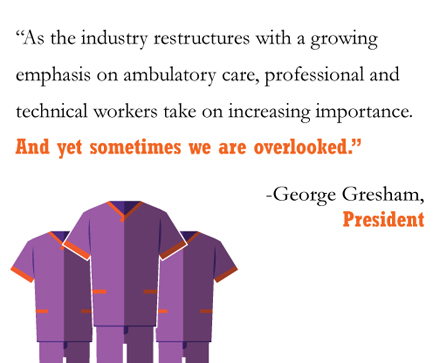The President's Column: We Value Our Professional and Technical Workers
September 28, 2016

I consider myself the luckiest guy in the world, being able to serve 400,000 dedicated caregivers as president of our Union.
But if I had never run for office or served on our 1199SEIU staff, I would still be very fortunate. My story is like those of thousands of our members. I started out in a hospital as a janitor and through our 1199 Training Fund, was able to become a radiology technologist—without ever having to open up my wallet.
I became one of what are now some 35,000 professional and technical workers in our union. We work in the labs and the pharmacies. We take x-rays and perform MRIs and CT scans. We are physical, respiratory and occupational therapists. We are paramedics, EMTs, substance abuse counselors, social workers, nutritionists, LPNs and physician assistants.
All 35,000 have advanced education and training, and require continuing education to both meet certification requirements and to keep up with changing technologies and advanced methods of analysis and treatment. We are absolutely vital to the delivery of quality care. And as the industry restructures with a growing emphasis on ambulatory care, professional and technical workers take on increasing importance. And yet sometimes we are overlooked.
Take our clinical lab techs. They may not be in direct contact with patients, but their role is essential to patient care. Some 70 to 80 percent of physician diagnoses are based on lab results. Without them, doctors would have to rely purely on guesswork in the fields of oncology, immunology, transplant medicine, genetics, nephrology and more.
As 1199 lab tech Rhode Hailik puts it, “We are the eyes of doctors. We help them see what’s happening inside their patients’ bodies.”
Low pay results in recruitment and retention shortages and staff shortages result in mandated overtime to complete normal workloads. For the healthcare profession, this is an unhealthy situation.
Lab technologists undergo a rigorous, five-year education— many are the first generation in their families to attend college —but their pay is comparatively low for their skill level. Low pay results in recruitment and retention shortages and staff shortages result in mandated overtime to complete normal workloads. For the healthcare profession, this is an unhealthy situation.
Some employers understand this situation. Others, not so much. Even those institutions that provide Training Fund money for continuing education don’t always allow release days for members to take necessary classes. Not every employer is prepared to negotiate these issues even when they’ve previously agreed to do so. Some employers remain short-sighted when it comes to equitable compensation for these trained professionals.
After many years of labor-management cooperation— joint lobbying efforts in legislatures to secure higher standards and credentialing, collaboration through our Training and Upgrading Fund—some employers seem ready to forgo such partnerships going forward. The “bottom line” seems to have overtaken the highest quality care as their first priority.
What else can we conclude when professional and technical healthcare workers are short-changed when it comes to paid release time for continuing education, short-staffing and competitive compensation rates?
Health care should be patient-centered in the first place. We know that many of our employers agree with this proposition. We begrudge none of them for raising their own executive salaries and administrative pay. But we can’t accept a short-sighted austerity approach when it comes to our healthcare professionals. That makes none of us better off and makes quality care delivery the foremost loser.

